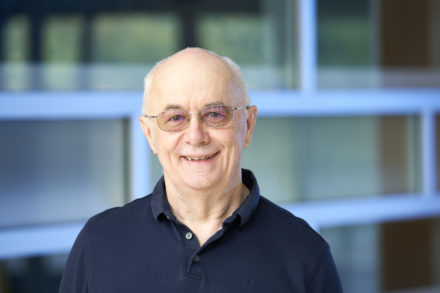
-
William Park
- Professor
- Focus Area: mediator complex, gene regulation, regulatory evolution, stress tolerance, yeast
- Office:
- BICH 214
- Email:
- [email protected]
- Phone:
- 979-845-8868
Education
- Undergraduate Education
- B.S. Chemistry, University of South Carolina, 1973
- Graduate Education
- Ph.D. Biochemistry, University of Florida, 1977
- Postdoc. Cellular and Molecular Biology, University of Minnesota, 1979
Areas of Expertise
- Molecular Biology,
- Biotechnology
- Genetics
Professional Summary
Much of my lab’s work over the last thirty years focused on manipulating starch biosynthesis to improve rice’s nutritional quality. The majority of this work was proprietary and thus not published, but it is represented by popular products currently on grocery store shelves in the U.S., Europe, and Australia. However, we have recently returned to basic science focusing on the mediator complex in yeast.
Mediator complex

Mediator structure 5OQM from Schilbach et al. 2017 with a context-dependent region involved in ethanol tolerance indicated in red
The Mediator complex plays key roles in gene expression in all eukaryotes and serves as a “central integrator” of genetic information. To serve this role, the Mediator must coordinate the expression of thousands of genes to support robust growth in a wide range of environmental conditions and also respond appropriately to many different types of stress. However, the Mediator must also be able to evolve to meet the needs of diverse organisms.
We found that replacing the nine amino acid region Med8 shown above in red with an unrelated sequence completely blocks growth on ethanol but has little effect on growth in the absence of ethanol. It also changes the expression of key genes involved in transcription, chromatin structure and the cell cycle. However, this sequence is only important if either the Med18/20 tether region of Med8 or the middle module subunit Med31 is absent. Deletion of both the Med18/20 tether and Med31 is lethal, again illustrating long distance communication with in the mediator complex. A manuscript describing this work has been submitted for publication.
More recently, we found mutations in other regions of Med8 that can differentially “reprogram” ethanol, methanol, NaCl, osmotic, acid, and oxidative stress responses with only modest effects on growth under non-stressed conditions. Unlike the sequence shown above in red, the differential effect of mutations in these new regions on stress responses does not require additional mutation.